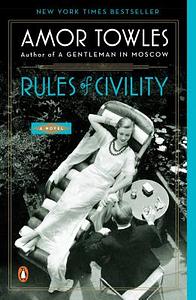Take a photo of a barcode or cover
Most people are high on A Gentlemen in Moscow, a book I thought was fine, but hard to relate to and care about—I now understand the hype around this author a bit more. Everything about this was compelling to me. At a couple key moments our narrator speaks about Autumn in New York, and why it feels so inviting.
This book feels like it could well be some strange alchemical process that analyzed that song and it’s fundamental components were put into plot beats and voice and character. Katey’s voice is steeped in nostalgia but her lens is untainted by rose coloured glasses. Somehow, whether in love of slighted, or both, it remains removed and non-judgmental. Having sorted the sordid affairs long ago and now, understanding them well enough, can move about the exhibit in a linear fashion, forming a narrative, but still have the remoteness of a tour guide.
It’s funny how many stories use a conceit like this: the old person with long ages lived naturally throw one particular year in sharp relief. If one confused fiction with life, or read too much perhaps, you might expect to hit a specific age and close your eyes one day and remember some teenage year with eidetic precision. At the cost, presumably, of so many other functions of memory. I probably find stories like this so compelling because my own memory doesn’t function at all like this.
Whatever the drug that is this book is, I’m certainly happy to have taken the trip. I don’t think there was a single dragging moment and Katey could talk about anything at all and I’d be happy. That’s a monumental feat of craftwork as it. But the notion most people have of New York City is both invoked and peeled back to reveal a bit of a wolffish underbelly, when you expected, somehow, an altogether different animal. Sure I knew it was hard to make it there. But it feels like instead, to these characters, all the city does is contrived circumstances in which all their secrets, of which everyone turns on, are exposed for what they are. Rich and poor alike. To the city they’re nothing but a turnstile.
In the way that all the best fiction seems to be, this book is about everything all at once; certainly the city and the times and The War. It’d be easy to say it’s focus is on classism, with Katey transgressing early on into the NYC socialite scene, the act itself being the thing to expose everyone and everything to come. But there is far more about the human condition to be found that this simple cause and effect.
This book feels like it could well be some strange alchemical process that analyzed that song and it’s fundamental components were put into plot beats and voice and character. Katey’s voice is steeped in nostalgia but her lens is untainted by rose coloured glasses. Somehow, whether in love of slighted, or both, it remains removed and non-judgmental. Having sorted the sordid affairs long ago and now, understanding them well enough, can move about the exhibit in a linear fashion, forming a narrative, but still have the remoteness of a tour guide.
It’s funny how many stories use a conceit like this: the old person with long ages lived naturally throw one particular year in sharp relief. If one confused fiction with life, or read too much perhaps, you might expect to hit a specific age and close your eyes one day and remember some teenage year with eidetic precision. At the cost, presumably, of so many other functions of memory. I probably find stories like this so compelling because my own memory doesn’t function at all like this.
Whatever the drug that is this book is, I’m certainly happy to have taken the trip. I don’t think there was a single dragging moment and Katey could talk about anything at all and I’d be happy. That’s a monumental feat of craftwork as it. But the notion most people have of New York City is both invoked and peeled back to reveal a bit of a wolffish underbelly, when you expected, somehow, an altogether different animal. Sure I knew it was hard to make it there. But it feels like instead, to these characters, all the city does is contrived circumstances in which all their secrets, of which everyone turns on, are exposed for what they are. Rich and poor alike. To the city they’re nothing but a turnstile.
In the way that all the best fiction seems to be, this book is about everything all at once; certainly the city and the times and The War. It’d be easy to say it’s focus is on classism, with Katey transgressing early on into the NYC socialite scene, the act itself being the thing to expose everyone and everything to come. But there is far more about the human condition to be found that this simple cause and effect.
I feel similar to this book as I do to Fitzgerald’s ‘This Side of Paradise’- good, but largely feel like something is just missing.
reflective
slow-paced
emotional
hopeful
emotional
sad
slow-paced
Plot or Character Driven:
Character
Loveable characters:
Complicated
Diverse cast of characters:
No
Flaws of characters a main focus:
Yes
emotional
funny
sad
slow-paced
Plot or Character Driven:
Character
Strong character development:
Complicated
Loveable characters:
No
Diverse cast of characters:
No
Flaws of characters a main focus:
Yes
At first glance Katey Kontent, the narrator of this glittering 1938 romp through Manhattan, seems like an opaque secondary character in the manner of Nick Carraway. She tells the story of how she fell into a crowd of people who are her social, if not intellectual, superiors and how she leapt from the secretarial pool and spending the new year at a second-rate jazz club to working at Conde Nast and attending lawn parties given by families with old money. From a working-class Brooklyn background, Kate is in firm possession of herself, which comes in handy as she navigates the difficult social terrain of interwar New York. As the novel progresses, it becomes clear that Katey, despite her focus on others, is the protagonist of this tale. Her cool wit, intelligence, and well-read erudition, which accounts for her ability to weave literary examples through her analysis of events either to subvert expectations or to enhance a moment's poetic resonance, are breathtaking. Few contemporary novels simultaneously call upon (but do not require) knowledge of Fitzgerald, Thoreau, James, Hemingway, Austen, and Chekhov, among others, to enhance appreciation of the plot, but this literary treat does.
Felt let down by the ending. The story was so interesting and compelling until the final chapters, though, that I found it overall to be a great read.
“I’ve come to realize that however blue my circumstances, if after finishing a chapter of a Dickens novel I feel miss-my-stop-on-the-train sort of compulsion to read on, then everything is probably going to be just fine.” Great read—after you finish, go back and read the prologue again to have everything tie together.
lighthearted




